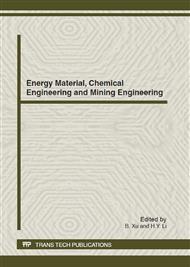p.69
p.73
p.77
p.81
p.85
p.89
p.93
p.97
p.101
The Research of Active Carbon on the Application of N-propyl Alcohol Reaction in Chemical Engineering
Abstract:
The sulfonated Petroleum coke is used to synthesize n-propyl alcohol(N-PROPYL ALCOHOL) by hydration of ethylene oxide(EO) in chemical engineering and the catalyst of sulfonated Petroleum coke (SPC) is studied. The effect of reactive temperature on the activity of SPC is greatest when reactive temperature goes up,the activity of SPC is quickly enhanced,but when temperature exceeds a certain range, the activity of SPC will reduce; And the activity of SPC will become stronger along with reactive pressure rise,when pressure exceeds a certain value,selectivity of N-PROPYL ALCOHOL will decrease; Also,increasing airspeed will weaken the activity of SPC. The conversion rate of EO reaches 98-100%
Info:
Periodical:
Pages:
85-88
DOI:
Citation:
Online since:
October 2012
Authors:
Keywords:
Price:
Сopyright:
© 2012 Trans Tech Publications Ltd. All Rights Reserved
Share:
Citation:


